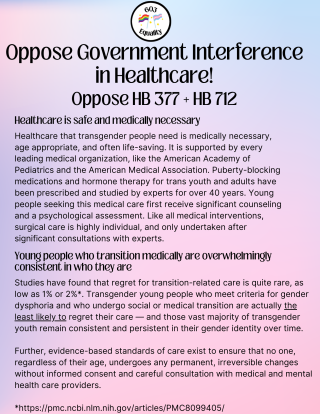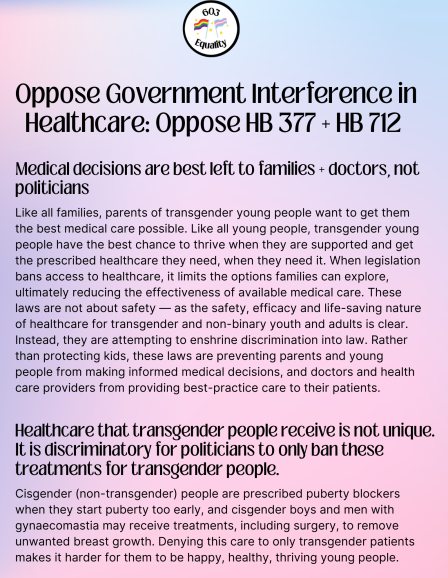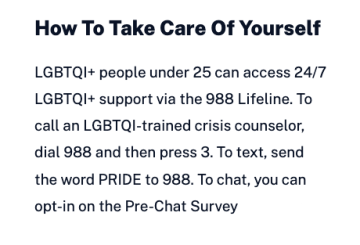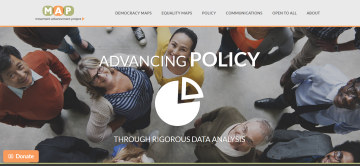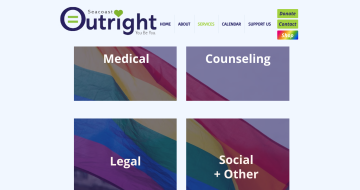
While we know not everyone understands what it means to identify as a member of the queer community as a young person, New Futures works to protect the mental health of all Granite State youth.
Unfortunately, there is a mental health crisis amoung young people here in New Hampshire. According to the most recent Youth Risk Behavior Survey results, more than one in five Granite State high school students reported that they had seriously considered attempting suicide in the past year1.
Like all young people, when LGBTQ+ youth feel support from their family and community, they have much better mental health outcomes. In fact, LGBTQ+ young people who had access to affirming homes, schools, community events, and online spaces reported lower rates of attempting suicide compared to those who did not2.
In a recent survey, nine out of ten LGBTQ+ young people said their well-being was negatively impacted due to recent politics3. Despite this, several 2025 bills in New Hampshire threaten the mental wellbeing of the Granite State's young people by specifically targeting LGBTQ+ youth and families. Learn more and take action below.
Take Action
Share Your Story
About the Bills
Expand each section below to learn more about each bill and their status in the legislative process.
Senate Bill 38, Senate Bill 268, & House Bill 148: Removing Anti-Discrimination Protections
About the Bills:
It's important for all Granite Staters to feel safe and have privacy in the places we visit every day.
Unfortunately, Senate Bill 38, Senate Bill 268, and House Bill 148 would make life harder and less safe for transgender Granite Staters in our communities. It would roll back bipartisan discrimination protections based on sex assigned at birth in restrooms and locker rooms at places we all need access to, like hospitals, workplaces, libraries, restaurants, stores, and more. While claiming to protect safety, the bill ignores that there are already laws in place making it illegal to harm or harass anyone in these spaces.
Particularly concerning, the bill would allow youth residential mental health facilities to enforce rigid new segregation policies, causing additional stress and making it harder for our kids to get the care they need.
Status of Bills:
-
Senate Bill 38
- February 13: The House Judiciary Committee held a public hearing. Over 1600 advocates signed in to oppose the bill, and only 82 showed their support.
- March 18: The committee held an executive session, where they unfortunately voted "ought to pass" 3-2, meaning the majority supported the bill.
- March 27: The entire State Senate looked at the bill, deciding by voice vote to table it in favor of SB 268, which has similar language. This means the bill's progress is currently stalled.
-
Senate Bill 268
- February 13: The Senate Judiciary Committee held a public hearing. Nearly 1800 advocates signed in to oppose the bill, and only 113 showed their support.
- March 19: The committee held an executive session and voted "ought to pass with amendment" 3-2, meaning the majority supported the bill as well as amendment 1118s.
- March 27: The bill was considered on the Senate floor. The amendment was adopted on a voice vote, then the bill was passed as amended by a 16-8 party line vote.
- April 16: The House Judiciary Committee held a public hearing.
- April 23: During an executive session, the Senate Education Committee ultimately decided to retain the bill in committee, meaning the bill's This means the bill's progress has stalled.
-
House Bill 148
- February 19: The House Judiciary Committee held a public hearing.
- March 3: The committee held an executive session and voted "ought to pass" 10-8, meaning the majority supported the bill.
- March 20: The bill was voted on in the full House. It passed on a roll call vote by a 201-166 margin, mainly along party lines. You can see how State Representatives voted here (click on "OTP (201-166).
- May 6: The Senate Judiciary Committee held a public hearing to listen to the public's thoughts about the bill. More than 600 advocates signed in to oppose the bill, and only 40 showed their support.
- May 15: The Senate Judiciary Committee voted 3-1 to recommend that the full Senate support the bill ("ought to pass").
- May 22: The full Senate voted 16-8 along party lines in favor of the bill. You can see how State Senators voted here (click on "Ought to Pass (16-8).
- Next: As HB 148 did not have a fiscal note and the same version of the bill was passed in each chamber, it did not need to go to the Senate Finance Committee or a Committee of Conference. The bill was carefully examined for technical errors by the Office of Legislative Services, signed off on by members of the House and Senate Enrolled Bills Committees, and then by the House Speaker and Senate President. It was then sent to the Secretery of State, who sent the bill to Governor Ayotte.
-
July 15: Your advocacy worked! HB 148 was vetoed by Governor Ayotte.
House Bill 10 & Senate Bill 96: Mandatory Outing in Schools
About the Bills:
House Bill 10 and Senate Bill 96 would require teachers to "out" students to their parents when requested. Bills like these with mandatory disclosure discourage young people from finding support that is critical to their well-being.
Status of Bills:
-
House Bill 10
- February 18: HB 10 had a hearing in the House Children and Family Law Committee. More than 1200 individuals signed in to oppose this harmful bill, with only 174 in support.
- March 4: An executive session was held, and committee members voted 9-7 to recommend that the bill should pass with amendment 695h.
-
March 20:
- Amendment 695h was adopted by a margin of 210-162.
- Floor amendment 1152h was brought, but failed 163-209.
- A legislator asked to table (stall the progress of) the bill, but that was denied 211-162, largely along party lines. You can see how State Representatives voted here (click on "Table (162-211)").
- Finally, the bill passed as amended by a vote of 212-161, largely along party lines. Republican Representatives Guthrie and Vandecasteele courageously voted against the majority of their party. You can see how Representatives voted here (click on "OTPA (212-161)").
- April 1: The Senate Education Committee held a public hearing where advocates made their voices heard. The bill received 739 sign-ins opposed, with only 39 people signing in to support it.
- May 13: The Senate Education Committee voted 3-2 to recommend that the bill should pass with amendment 2150s.
- June 5: The entire Senate voted to approve the bill, amendment 2150s, and amendment 2646s on voice votes. The House voted 210-160 to approve the Senate version of the bill.
- June 10: Governor Ayotte signed the bill into law.
- July 1: The law went into effect.
- March 4: Senate Bill 96 had a hearing in the Senate Education Committee. More than 1200 individuals signed in to oppose the bill, and only 138 supported it.
- March 18: Committee members held an executive session, voting 2-1 "ought to pass" in support of to bill.
- March 27: The bill was considered on the Senate floor, where it passed by a 16-8 party line vote.
- April 9: The House Education Policy and Administration Committee held a public hearing. More than 600 advocates signed in online against the bill, with only about 200 in support.
- May 20: An executive session was held, and committee members voted 9-8 to recommend that the bill should pass with amendment 2199h.
-
June 5:
- The House voted 198-162 to adopt amendment 2199h, as well as floor amendments 2699h by a voice vote and 2713h by a 186-179 margin. There was a roll call vote to pass the bill with those amendments that succeeded 198-172. Those 172 opponents included courageous Republican Representatives Boyd, Bridle, Bryer, Coker, Guthrie, Nagel, Proulx, and Taylor. You can look up how any Representative voted by clicking on "OTPA (198-172)" under "Roll Calls".
- The Senate did not agree to the House amendments and requested a Committee of Conference to work out the differences on a voice vote.
- June 19: This was the last day to sign Committee of Conference reports, which this Committee declined to do, ending the bill's progress in 2025.
House Bills 377 & 712: Bans on Medically Necessary Care
About the Bills:
Transgender teens, like all teens, have the best chance to thrive when they are supported and can get the doctor-prescribed medical care they need. Medical decisions should rest solely with doctors and families — not politicians.
House Bill 377 and House Bill 712 would prevent Granite State youth from receiving evidence-based, medically necessary care that research shows can benefit the mental health and well-being of transgender youth. Gender-affirming care has been endorsed by leading U.S. medical authorities like the American Academy of Pediatrics1 and the American Medical Association2.
The bills would create significant changes to existing healthcare practices in New Hampshire and subject health care providers to lost medical licenses or even felony charges for fulfilling their ethical obligation to offer medically necessary care to protect the health and well-being of some transgender youth.
Bill Status:
-
House Bill 377
- March 3: HB 377 had a public hearing before the House Health, Human Services, and Elderly Affairs Committee. There were 1,659 individuals who signed in to oppose the bill, and only 106 in support.
- March 19: The committee held an executive session, recommending 10-8 that the bill "ought to pass" with amendment 1083h, which would allow minors currently receiving hormone therapy to taper off the medication.
- March 27: On the House floor, amendment 1083h was adopted by a 350-4 margin. Another amendment was brought forward that would have allowed minors who were already receiving hormone therapy to continue their treatment, but it failed. In the end, the bill passed by a roll call vote, 197-167, mainly along party lines. You can see how State Representative(s) voted here (click on "OTPA (197-167)").
- April 23: The Senate Health and Human Services Committee had a public hearing. A total of 993 individuals signed in against the bill online, and only 193 indicated they supported the bill.
- May 21: Despite overwhelming opposition to the bill from the public, the Senate Health and Human Services Committee voted 3-2 to add amendment 2354s and give the bill a positive recommendation.
- June 5: The Committee's amendment and two floor amendments (2514s and 2621s) were adopted on voice votes. The entire Senate voted 16-7 along party lines to pass the bill as amended. The House then decided by voice vote not to agree to the Senate's version of the bill and requested a Committee of Conference to hash out the differences between the two versions. The Senate agreed, and both chambers appointed members to the Committee.
- June 26: The Conference Committee finalized its compromise version of the bill. The Senate floor approved the bill on a 16-8 party line vote, and the House did so with a 202-161 roll call. Republican Representatives Bridle, Guthrie, and Nagel courageously voted to oppose the bill. You can see how State Representative(s) voted here (click on "Adopt CofC Report (202-161)").
-
August 1: Governor Ayotte signed the bill into law.
-
September 30: Law goes into effect with the exceptions of sections 1 and 2.
-
January 1, 2026: Sections 1 & 2 go into effect.
-
House Bill 712- March 3: The bill had a public hearing before the House Health, Human Services, and Elderly Affairs Committee. There were 1,279 individuals who signed in to oppose the bill, and only 106 in support.
- March 19: The committee held an executive session, recommending 10-8 that the bill "ought to pass" with amendment 1138h.
- March 27: On the House floor, amendment 1138h was adopted on a voice vote. The bill passed by a roll call vote of 200-165, mainly along party lines. You can see how State Representative(s) voted here (click on "OTPA (200-165)").
- April 23: The Senate Health and Human Services Committee had a public hearing. A total of 946 individuals signed in against the bill online, and only 188 indicated they supported the bill.
- May 7: Despite overwhelming opposition to the bill from the public, the Senate Health and Human Services Committee voted 3-2 to add amendment 1987s and give the bill a positive recommendation.
-
June 5: The Committee's amendment and two floor amendments (2506s and 2508s) were adopted on voice votes. The entire Senate voted 16-7 along party lines to pass the bill as amended. The House then decided by voice vote not to agree to the Senate's version of the bill and request a Committee of Conference to hash out the differences between the two versions. The Senate agreed and both chambers appointed members to the Committee.
-
June 26: The Conference Committee finalized their compromise version of the bill. The Senate floor approved the bill on a 16-8 party line vote, and the House did so with a 191-163 roll call. Republican Representatives Bridle, Guthrie, Nagel, Prout, and Vandecasteele courageously voted to oppose the bill. You can see how State Representative(s) voted here (click on "Adopt CofC Report (191-163)").
- August 1: Governor Ayotte signed the bill into law. Some parts of the law went into effect upon signing.
-
January 1, 2027: All sections of the bill will be in effect.





